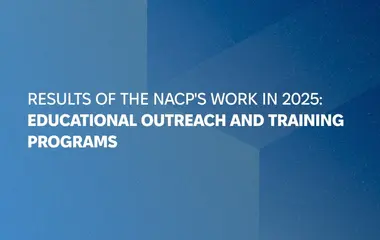In pursuance of the decision of the National Security and Defense Council of Ukraine of October 22, 2024, the National Agency on Corruption Prevention (NACP) checked the status of implementation of the recommendations identified in the study "Top 10 Corruption Risks of Medical and Social Expertise for Determining Disability", which was conducted in 2021 and updated the study to reflect the legal regime of martial law.
NACP collected and analyzed information from the Ministry of Health of Ukraine, the Ministry of Social Policy of Ukraine and the NGOs Independent Anti-Corruption Commission and All-Ukrainian Human Rights Organization Legal Hundred on the implementation of previous recommendations to minimize corruption risks in the work of medical and social expert commissions (MSECs). The results of monitoring the implementation of the recommendations confirm that most of the measures proposed by NACP for public authorities in the previous study are either in the process of implementation or have not been implemented. NACP emphasizes that the implementation of the recommendations by the public authorities in previous years would have minimized corruption risks and prevented numerous corruption schemes.
NACP experts, together with the “Institute of Legislative Ideas” (ILE), identified the sources and identified the ten main corruption risks of the MSEC in establishing disability. These are:
- corrupt arrangements based on personal contact between the applicant and the head or member of the MSEC;
- mediation of a state body official in reaching a corrupt agreement with the head and/or members of the MSEC;
- regional cooperation between the chairperson and/or members of different MSECs in order to obtain an unlawful benefit;
- mediation of citizens without the status of officials or employees in reaching a corrupt agreement with the chairman and/or members of the MSEC;
- accelerating the preparation of a referral and the necessary package of documents for the MSEC by a doctor without signs of forgery in case of obtaining an undue advantage;
- preparation by a doctor of a package of forged primary documents without assistance in further decision-making by the MSEC;
- “comprehensive” corrupt service - “turnkey” disability;
- use of paperwork for corrupt practices by the MSEC;
- issuance of fictitious disability documents to persons liable for military service by the MSEC to facilitate their illegal crossing of the state border;
- conspiracy of MSEC doctors to extort illegal benefits from citizens.
The updated study is based on a comprehensive analysis. In particular, NACP analyzed current regulations and key draft laws in the field of reforming the MSEC, international experience to study the best practices of organizing the MSEC, as well as analysis of court decisions illustrating specific cases of corruption offenses. The final stage of the study included anonymous interviews with key stakeholders - military personnel, civilian patients and representatives of medical institutions - who provided important information to assess the real state of affairs in the MSEC system. The strategic analysis of corruption risks in the MSEC showed that the current procedures are too complicated, non-transparent and have many shortcomings that facilitate corruption.
Taking into account the legislative initiatives proposed by the Government related to the implementation of the assessment of the daily functioning of a person, the Agency proposed to define a clear and transparent mechanism for conducting such an assessment, in particular
- deadline for the assessment, clear criteria for determining the stages of the assessment, grounds for repeated/extraordinary assessment;
- clear requirements for the formation of expert teams (through automatic formation of teams with the introduction of a single automated system), determination of their quantitative and personal composition, grounds and main components of the procedure for making evaluation decisions;
- to extend to members of expert teams the requirements and restrictions set forth in the Law of Ukraine “On Prevention of Corruption” in order to prevent them from making decisions in conditions of real or potential conflict of interest;
- key requirements for the functioning of the information and communication system in the healthcare sector and the procedure for access to the information contained therein;
- an exhaustive list of functions of expert teams.
"The implementation of the NACP recommendations requires an active position of the relevant authorities. Only then will it be possible to minimize the identified corruption risks, fulfill the requirements for the incompatibility of corruption practices in the procedures of medical and social examination for disability determination and reduce the burden on law enforcement and judicial systems,” commented NACP Head Viktor Pavlushchyk on the published study.
"Transparency and fairness in the field of medical and social expertise is not only a matter of social protection, but also a key element in strengthening the state's defense capability. The proposed recommendations are based on a comprehensive approach. Their rapid implementation will become the basis for reforms that will introduce a new standard of trust in society and increase the efficiency of the state,” emphasized Tetyana Khutor, Head of the Institute of Social Research.
More information about the updated study “Top 10 Corruption Risks of Medical and Social Expertise on Disability Determination”, taking into account the legal regime of martial law (as of November 2024), can be found at the link.
NACP will assess the implementation of the recommendations in June 2025.
As a reminder, on November 18, the President of Ukraine signed a law on improving the procedures for conducting the MSEC.









